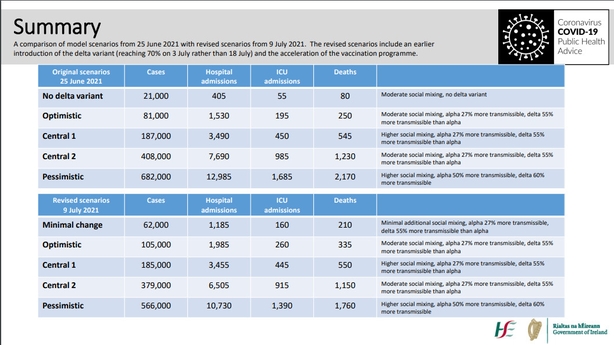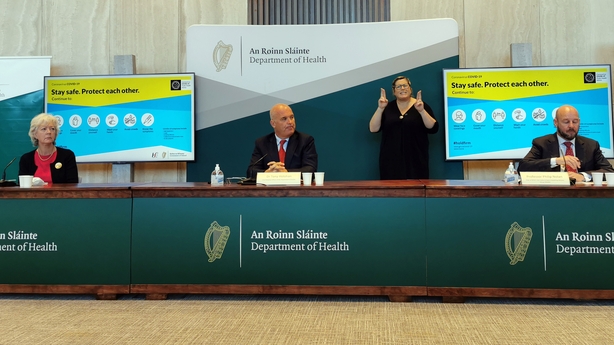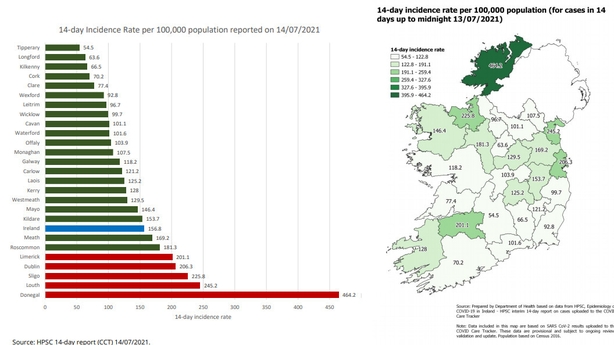The Chief Medical Officer has advised parents that it is safer not to bring children into indoor dining settings and this is the "responsible public health advice".
Speaking at a National Public Health Emergency Team (NPHET) briefing, Dr Tony Holohan said for those who wished to go out with their children, "dining outdoors is still possible".
The Government is planning to permit pubs and restaurants to serve indoors again next week to those who can demonstrate proof of being fully vaccinated.
The children of those fully vaccinated will also be permitted to enter such settings with their parent or guardian.
However, Dr Holohan said today that caution still needs to be exercised given the spread of the Delta variant around the country.
"You don't have to go indoors," he said. "We know that Delta transmission among children can happen."
He also said it may be "weeks rather than months" until "where we begin to see levels of vaccine uptake in the population, levels of protection in population as a result of vaccination that allows us to look at removing some of the arrangements that are currently in place".
Dr Holohan added that the virus still has the potential to surprise us and there are other challenges such as flu that winter is going to bring.
The Chief Medical Officer has advised those who are not vaccinated to be "very cautious". Dr Tony Holohan advised unvaccinated people to confine their activities to those that are low risk and to take all the precautions, such as wearing a mask | https://t.co/6kqeD8ocPZ pic.twitter.com/dOkdsheCFe
— RTÉ News (@rtenews) July 14, 2021
His comments came after another 783 cases of Covid-19 were reported by the Department of Health.
There are 20 people in ICUs being treated for Covid-19 - an increase of three from yesterday. There are 73 people being treated in hospital.
We need your consent to load this rte-player contentWe use rte-player to manage extra content that can set cookies on your device and collect data about your activity. Please review their details and accept them to load the content.Manage Preferences
It was confirmed that 12 deaths linked to the virus were reported in June, and one so far this month. It brings the total number of deaths since the start of the pandemic to 5,018.
We are, sadly, still reporting deaths from COVID-19, but a very much smaller number in the last three months: we know of 31 people who died in May, 12 in June. Vaccines have already saved many lives. #VaccinesWork pic.twitter.com/wbv5x9pbw8
— Professor Philip Nolan (@President_MU) July 14, 2021
Delta having a 'considerable impact' on transmission
Deputy Chief Medical Officer Dr Ronan Glynn said that the latest data available is showing "clear increases in incidence of disease right across the country".
He said: "There is no question that the Delta variant is having a considerable impact of transmission of Covid-19.
"Delta also appears to be presenting with a different variety of symptoms than we have seen with other variants, including headache, sore throat and blocked or runny nose. If you have any symptoms of a cold or flu it is vital that you isolate immediately and arrange a test."
Dr Glynn said that 626 cases in the past fortnight, around one in 10 cases, related to travel.
Deputy CMO Dr Ronan Glynn says that there have been 626 travel-related Covid-19 cases over the past fortnight, representing more than one-in-ten cases where contact tracers have been able to identify the likely source of disease transmission | https://t.co/6kqeD8ocPZ pic.twitter.com/C7W5oX55PD
— RTÉ News (@rtenews) July 14, 2021
He said when they asked people who have tested positive for Covid-19 where they have travelled in the past 14 days, they have found that a significant number of positive cases over the past fortnight have been in Spain in the previous few days.
He said Spain, Britain and Portugal have particularly high numbers.
Concern and uncertainty about what lies ahead
Professor Philip Nolan who chairs NPHET's Irish Epidemiological Modelling Advisory Group told the briefing that the epidemiological trajectory and what their modelling is showing might transpire into the future is "a cause for considerable concern".
He said at the same time there is very significant uncertainty about the direction that the country might take over the coming six to eight weeks.
He said that direction is determined by the precautions people take around our social contacts.
Prof Nolan said that "the bottom line from this presentation is around the need for caution over the next number of weeks, until such time as a substantial majority of the adult population are fully vaccinated".
Prof Philip Nolan says that Covid-19 case counts are currently growing at 3.5% per day, and the reproduction rate at which the virus is transmitting is estimated between 1.1 and 1.3 | https://t.co/6kqeD8ocPZ pic.twitter.com/W9ty8BFpQC
— RTÉ News (@rtenews) July 14, 2021
"One of the most marked aspects of the growth in incidence is that it is very much a feature of unvaccinated cohorts", he said.
At the top of that chart is 19-24 year olds, behind that is 13-18 year olds and 25-34 year olds. In the past 14 days, 24% of cases were in the 19-24 age group and 20% was in the 25-34 age group.
Prof Nolan said one of the uncertainties that faces them into the coming weeks, is that it is not yet clear how an increase in case count will translate into hospitalisations and admissions to ICU.
Prof Philip Nolan says that one of the uncertainties that faces them in the coming weeks, is that it is not yet clear how an increase in covid-19 case count will translate into hospitalisations and admissions to intensive care | https://t.co/6kqeD8ocPZ pic.twitter.com/ZBxWTlDPQk
— RTÉ News (@rtenews) July 14, 2021
He said that recent decisions, such as the introduction of Janssen and AstraZeneca vaccines for the 18-35 age group, had been factored into their modelling.
Over the three months, the accelerated vaccination programme would take potentially about 30,000 cases out of the equation, some in August and most of them in September.
Prof Nolan said there is huge uncertainty in any given estimate, including how children are going to be susceptible and transmit this infection.
Later, in post on Twitter, he warned: "We see very steep increases in incidence in young people, concentrated in those aged 16-30 years; this is a real risk to their health.
"If the disease gets out of control in this cohort it will break through the protection of vaccination into more vulnerable groups."

Unvaccinated should be 'very cautious'
Dr Holohan also said that those who have had a vaccine can regard themselves as being able to partake in the activities that are now open or will be open in the coming weeks.
He said he is still asking people to take precautions and they need to be aware of respiratory symptoms and stay away from others if they have such symptoms
He said: "This must become the new normal for us, this is one of the learnings out of this, this needs to become the new passive smoking, it's not something we should subject people to... when we have respiratory symptoms, that's the message for people who are vaccinated."
Dr Holohan said that those who are not vaccinated must be "very cautious".
Dr Tony Holohan said those who are vaccinated can regard themselves as being able to partake in the activities that are now open or will be open in the coming weeks. However, he said he is still asking people to take precautions | https://t.co/6kqeD8ocPZ pic.twitter.com/XCE9aAtJP9
— RTÉ News (@rtenews) July 14, 2021
"At the very minimum try to differentiate for yourself those activities that are high risk," he said, and urged
people to stay away from high-risk indoor environments.
"Your vaccine is not far away," he added. "We need to keep this up for another period of time that will take us into September then we will look at whether these arrangements need to be maintained.
"But until then, and it's not a very long time, except that it is if you’re one of those people who are waiting for a vaccine and you’re frustrated, but keep your activities to low-risk activities if you’re waiting for a vaccine."
On the issue of international travel, Dr Holohan said the message from NPHET is for people to wait until they receive their vaccination before travelling abroad.

Almost 60% of adults now fully vaccinated
Professor Karina Butler, who chairs the National Immunisation Advisory Committee (NIAC), said: "70% of the adult population have had at least one dose of Covid-19 vaccine and almost 60% of adults are now fully vaccinated against Covid-19."
She told the briefing that she has not seen vaccine hesitancy in regards to young people and the Janssen vaccine.
"Actually, it's been quite the reverse, in that the enthusiasm and uptake for vaccination has been more than I anticipated in those age groups," she said.
Dr Butler said that advice would arrive in the "near future" on giving vaccines to young children, and on the questions around mixing of vaccine types and the need for boosters.
She said that all three were being examined at the moment and they are "important questions" to unpick.
High incidence in Donegal, Louth, Dublin, Sligo, Limerick
Dr Glynn said that NPHET is seeing a much higher incidence of the disease in Donegal. He said there was also an increased incidence in a number of areas, particularly Louth, Dublin, Sligo and Limerick.
"The two areas with the highest incidence in the country are in Donegal, Buncrana and Carndonagh, followed by Limerick City North, Ongar, and Ardee largely reflecting what we are seeing at the county level," he said
"The situation has begun to deteriorate across many parts of the world again, with a 10% increase last week on the previous week with 3 million cases reported."

Dr Glynn said despite 50% of the population in the Netherlands being vaccinated, "last week they saw 500% increase in cases week on week and the latest estimate of R is 2.17".
Looking at the UK, he said, despite high levels of vaccination, there was a 27% increase in cases week on week, and the UK is also experiencing an increase in hospitalisations, with a 54% increase week-on-week.
He said while cases are coming back from their peak in Scotland, over 2,500 cases were reported today with over 500 people in hospital and over 80 people per day on average being admitted to hospital with Covid-19.
Meanwhile, a further 636 cases of Covid-19 have been reported in Northern Ireland today, the Department of Health said.
One further coronavirus-linked death has also been reported, bringing the toll to 2,159.
As of this morning, there were 72 Covid-19 positive patients in hospital, with two in intensive care.

